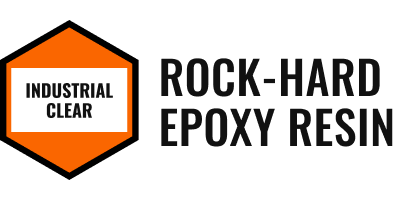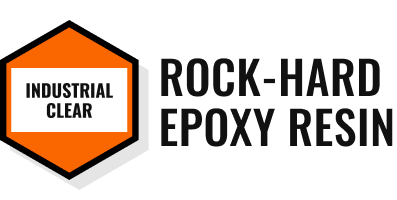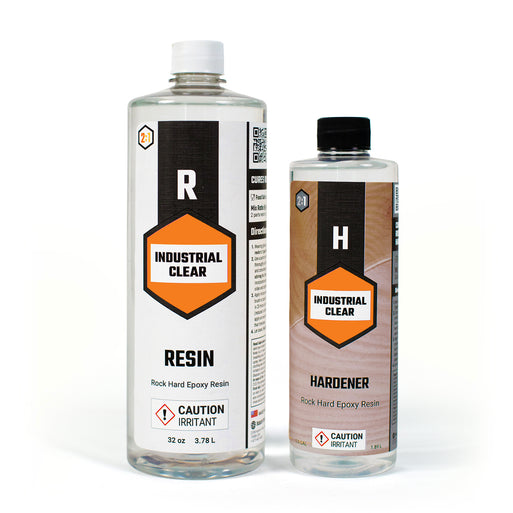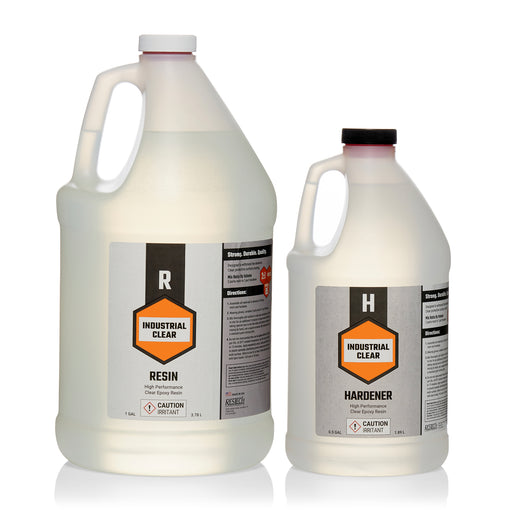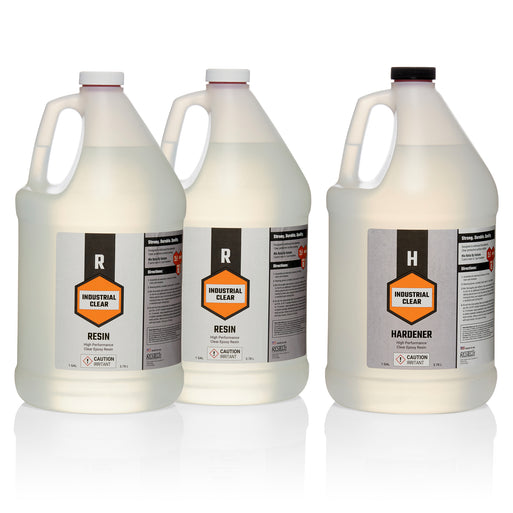Do you know the hardness rating of your epoxy resin?
It's measured using the Shore Hardness Scale, a system that determines how resistant a material is to denting or scratching. The Shore Scale includes several systems (like Shore A, Shore D, and Shore OO) used for different material types.
Epoxy Resins are measured on the Shore D scale for rigid materials.
If you're coating surfaces like countertops, tables and bar tops, you’ll need an epoxy resin that cures hard (in other words, a high Shore Rating) to do the job properly and guarantee a long-lasting finish.

Chart Of Shore Ratings
Below is a chart outlining the Shore ratings of some commonly found materials.
Shore 00 is for very soft gel materials.
- Marshmallows and gummy candies: 10
- Chewing gum: 20
- Gel shoe insert: 30
- Silicone mold: 50
Shore A measures the hardness of flexible rubber materials.
- Rubber band: 25
- Inner tube: 40
- Pink eraser: 55
- Car tire tread: 70
- Skateboard wheel: 98
- Golf ball: 50
- Wood ruler: 70
- Hard hat: 75
Bone: 90

What is the Shore Hardness rating of Industrial Clear?
While Industrial Clear feels hard to the touch after 24 hours, it's important to note that it reaches its absolute full cure at 48 hours. When prepared according to instructions, it cures into a long-lasting, durable coating that can resist scratches and damage for years.

The Science Behind Epoxy Hardness
When you mix Industrial Clear's resin and hardener, a chemical reaction begins that creates what's a "cross-linking" effect. Think of it as weaving individual threads into a tight fabric - the more connections between the threads, the stronger the fabric.
In epoxy, polymer molecules bond together, forming a dense three-dimensional network. This interlocking structure is what gives Industrial Clear its 83D Shore hardness and exceptional strength.

How is the hardness of a material measured?
Hardness is measured with a durometer: a device featuring a pointed metal indentor with spring resistance. A durometer works by pressing the spring-loaded steel tip into a surface to measure how resistant the material is, based on the depth of the indentation and the force required to create it.

How to Test Hardness (Step-by-Step)
Equipment Needed:
-
Shore D durometer
-
Flat surface
-
Cured sample (minimum 3 mm or 1/8" thick)
-
Notebook for results
Testing Steps:
-
Wait 7 days for full cure ✓
-
Place sample on flat, hard surface
-
Press durometer straight down in one motion
-
Read number immediately
-
Take 5-10 readings in different spots
-
Calculate average
What The Results Mean:
-
Industrial Clear should read 81-85D (average 83D) ✓
-
Variation of ±2 points is normal
-
Below 81D = incomplete cure
-
Above 85D = may be brittle
Quick Test Without Equipment:
-
Press fingernail firmly into surface after 7 days
-
Properly cured 83D epoxy will NOT dent
-
If fingernail leaves mark = not fully cured
Professional testing follows ASTM D2240 standards.

What Affects Epoxy's Hardness?
The following 5 Factors can determine the final hardness of epoxy resin.
1. Curing Temperature is Essential
Epoxy prefers warmth, so it's important to ensure that your resin - and the room you're working in - is warm enough.
The ideal temperature for working with Industrial Clear is between 70-80°F (21-27°C).
-
If too cold, you may experience issues: the epoxy becomes thick and difficult to mix, it has a cloudy appearance due to micro bubbles, and it can cure with surface imperfections or not at all.
-
If too hot, above 80°F, it may result in an exothermic reaction where the resin gets too hot, too fast and can end up curing instantly, even smoking or cracking.
Warm Water Bath
If your resin feels cold, simply allow it to come to room temperature or give the tightly capped resin and hardener bottles a warm water bath before measuring. Always dry the bottles thoroughly before opening them. Keep in mind that warming the epoxy reduces the working time by about 10 minutes.
Maintain Stability
Maintain the temperature while the epoxy cures to ensure a smooth finish. If the temperature drops drastically while curing, you may end up with surface dimples in the final finish.
2. Mixing Ratio
One of the key factors in achieving a hard, durable finish is to ensure the epoxy is accurately measured. Inaccurately measured resin will result in a failed cure.
To use Industrial Clear, combine 2 parts resin to 1 part hardener, by volume.
You can pour and mix in the same container in any order, as long as you stick to the correct ratio. Do not weigh the components or add more hardener to speed up the cure, or you’ll end up with a sticky mess.
💡 TIP: Calculate Your Needs To determine the required amounts of resin and hardener for your specific project, please use our online calculator at www.industrialclear.com/calculator.
3. Mixing Thoroughness
Thorough mixing is critical for a successful cure.
Mix your resin and hardener slowly for a full 4 minutes, using a flat-edged stir stick to scrape the side and bottom of the container. Stir slowly to minimize the creation of bubbbles.
Do not scrape the container as you pour the epoxy out. Unmixed material will almost always cling to the sides and bottom, which will create soft spots if it lands on your project.
If you wish, you can transfer your mixture into a second, clean mixing container and mix for an additional minute. This technique ensures that any unmixed material is fully incorporated into your final batch.
4. Working & Curing Time
Working Time & Exothermic Warning
Once mixed, Industrial Clear has a working time of approximately 45 minutes before it becomes too thick to pour and spread.
- Epoxy resin is highly sensitive to both mass and temperature. If left sitting in the mixing container, the entire volume will generate internal heat (an exothermic reaction), causing it to cure much more quickly - possibly even flash curing.
- For the best results, pour the mixture onto your project as soon as possible after mixing. We also recommend using a large container with a wide opening to help disperse heat and avoid an exothermic reaction.
Final Cure Times
It's essential to let the epoxy fully cure before putting your project into use.
- Industrial Clear will be solid and dry to the touch at the 24 hour mark.
- It reaches its final, rock-hard cure after 7 days. It's essential to let the epoxy fully cure before putting your project into use. Epoxy cannot be considered safe for food contact until this full 7-day curing process is complete.
Troubleshooting the Cure
Remember that epoxy is sensitive to temperature while curing:
- If the resin is not dry to the touch after 24 hours and you suspect cool temperatures are the culprit, try increasing the room temperature.
- If it remains sticky after a further 24 hours, this indicates a chemical reaction failure and the the resin will not cure any further.
5. Environment
Always use epoxy resin in a dust-free, well-ventilated space. While Industrial Clear has no fumes or VOCs (Volatile Organic Compounds), good ventilation is always recommended for your comfort and safety. Working in a clean environment is also crucial, as you risk having dust particles settle into your wet resin.
Ideal Working Conditions
Warm and dry conditions are best when working with Industrial Clear.
- The ideal working temperature is between 70-80°F (21-27°C)
- Aim for humidity around 50% (and no higher than 80%).
Ensure the temperature and humidity remain stable and do not fluctuate during the initial curing phase. If the temperature dips in the first 24 hours, you may end up with dimples in your cured resin.
Common Hardness Problems & Solutions
Problem: Sticky
Causes:
-
Too cold during curing
-
Insufficient mixing
-
Inaccurate Measuring
How to Fix:
- Increase the room temperature to 70-80°F or 21-27°C and maintain it for 24 hours
- If the epoxy remains sticky, it indicates a failed chemical reaction and it will not cure further. If necessary, remove any wet, liquid epoxy. Prepare a carefully measured and mixed batch of epoxy and pour over top in warm, dry conditions.
Prevention:
-
Measure Accurately: Always adhere strictly to the 2:1 ratio by volume.
-
Mix Thoroughly: Mix for a full 4 minutes, scraping the container as you go.
-
Maintain Conditions: Cure in warm and dry conditions (70-80°F or 21-27°C, below 80% humidity).
Problem: Soft Spots
Causes:
-
Incomplete mixing
-
Scraping the mixing container to get every last drop out
How to Fix:
-
These soft spots will not cure. You must scrape out any wet material (if any), sand down areas of perfectly cured resin, and pour a fresh batch of carefully measured & mixed epoxy over top.
Prevention:
- Avoid scraping the mixing container when pouring
- Transfer your mixture into a second, clean mixing container and mix for an
additional minute
Problem: Waxy, Greasy Film After Curing
Cause:
-
May have amine blush caused by excess moisture/humidity
Solutions:
-
Wash with soapy water to remove the film from the surface
-
If it still remains, use an abrasive pad, like a Scotch-brite pad to remove the film. This will scratch the cured surface and will require a fresh layer of epoxy over top to restore the gloss.
Is epoxy harder than glass?
Glass is typically harder than epoxy resin but is considerably more fragile. In contrast, epoxy resin provides the same glossy and crystal-clear appearance as glass but with greater durability. Resin's natural flexibility means it can better withstand impact and is more likely to bend than break, unlike glass which can shatter. Epoxy resin is more susceptible to dullness and scratches, however surface damage can be fixed by applying a fresh layer of resin on top.
Is epoxy as strong as steel?
While not as strong as steel, epoxy resin does offer a number of notable advantages. Steel is susceptible to erosion, with deep scratches causing rust and corrosion issues even on coated steel.
In contrast, epoxy resin is resistant to rust and corrosion and impervious to moisture, chemicals, and bacteria. Furthermore, its strength makes it a viable alternative to welding and soldering. A potential drawback, however, is its tendency to become brittle in extremely cold temperatures.
Nonetheless, epoxy composites are quickly emerging as the strongest materials available, surpassing conventional options like steel, and are being increasingly utilized for constructing and reinforcing structures.
Is epoxy stronger than glue?
Glue also has the advantage of being cheaper and can be applied directly from the bottle without the need for mixing. However, if you have leftover resin, you can easily re-purpose it to fix a number of broken objects around the house, to cover rust on metal, and to seal and waterproof various items.It's important to note that, while glue bonds porous materials such as clay and wood together well, whereas epoxy resin tends to soak in. A good solution is to seal porous materials first, creating a barrier that will prevent epoxy from absorbing.
Is epoxy harder than concrete?
Epoxy resin’s outstanding mechanical properties make it stronger than concrete. Once cured, it becomes almost unbreakable, significantly reducing the chances of cracks or damage from impact or abrasion. Furthermore, cured epoxy requires minimal maintenance and will endure heavy wear and tear for decades with exceptional resistance to chemicals, moisture and bacteria.
One distinct advantage of concrete is that it’s more fire-resistant than epoxy resin. Nevertheless, concrete is more prone to cracking and has poor resistance to chemicals, moisture and mold.
Epoxy vs. Polyester Resin
-
Polyester: 70-75 Shore D (softer)
-
Epoxy (Industrial Clear): 83D ✓ (harder)
-
Epoxy: Better adhesion, stronger, more durable
-
Polyester: Cheaper, faster cure
-
When to use each
Epoxy vs. Polyurethane
-
Polyurethane: 55-75 Shore D (more flexible)
-
Epoxy: Harder surface, better scratch resistance
-
Polyurethane: Better impact resistance
-
Epoxy best for: Countertops, bar tops ✓
-
Polyurethane best for: High-impact areas
Epoxy vs. Acrylic
-
Acrylic: 70-80 Shore D
-
Industrial Clear: 83D (harder) ✓
-
Epoxy: Better chemical resistance, stronger
-
Acrylic: UV-resistant, faster drying
| MATERIAL | SHORE D | BEST FOR |
| Industrial Clear Epoxy Resin | 83D | Countertops, bar tops, tables |
| Polyester Resin | 70-75D | Budget projects |
| Polyurethane | 55-75D | Flexible coatings |
| Acrylic | 70-80D | Quick applications |
| Glass | 90-95D | Windows (but brittle) |
Read about the benefits of using a hard cure epoxy resin.
Industrial Clear: Rock Hard Epoxy Resin
